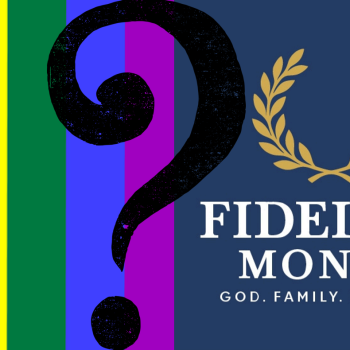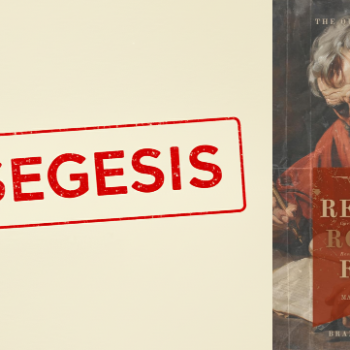Do you appreciate information? If wrong, are you open to correction? If not, why? Or maybe you think “truth” is impossible to discern or that your lived experience is too complex for any supposed “answers.” Recently, Catholic Answers received a fair amount of criticism for the former Fr. Justin AI. Some of these critics used the opportunity with Justin to bounce on apologetics altogether. In turn, their readers jumped on the bandwagon to declare apologetics just another “right-wing” tactic to impose ridged views of Christianity and morality on others.
For example, fellow Patheos writer Mary Pezzulo states:
Apologetics is the triumphalist art of having an answer for every anticipated objection. Apologists don’t seek to understand but to explain away. Apologetics doesn’t dwell with people in their difficulty and darkness; it just plows over their objections with sound bites. An apologist is someone who has a barrage of verbal spitballs to spit back at any question or concern, without trying to understand where the questioner is coming from or if the questioner knows something you don’t. Apologetics isn’t a dialogue. Apologetics is an algorithm.
Is Mary right?
In this article, I explore the need and purpose of apologetics. I demonstrate that in the larger Christian world, and especially in our everchanging world, apologetics provides answers to many questions that could shipwreck one’s faith. Furthermore, I think providing clear cut answers also limits the room ambiguity provides for moral and theological tomfoolery.
Trent Horn’s Defense of Apologetics
In a recent article, I reviewed Trent Horn’s new book, Confusion in the Kingdom : How “Progressive” Catholicism Is Bringing Harm and Scandal to the Church. In the book, Horn addresses the progressive Catholic criticism of apologetics. Regarding the criticism of apologetics as uninspiring, unimaginative, not honoring lived experiences, and too judgmental, Horn responds:
Inspiring, engaging, and listening to non-Catholics are crucial to evangelism. But so are questioning and convincing those same people that the Catholic faith is true. And apologetics is one of the best ways to demonstrate this truth, especially when it is done in an engaging way that listens to those it seeks to persuade.
And
…just because apologetics can be done badly doesn’t mean we need to get rid of it or “reform it” beyond recognition. People can perform works of mercy like feeding the poor in a patronizing and condescending way that “loses a soul.” All of our evangelism should imitate Christ, such as when he graciously refuted opponents like the Pharisees and used those opportunities to call more people to believe the gospel.
Now, Horn’s comments may seem self-serving, as apologetics represents a main source of his income. However, such a criticism constitutes a genetic fallacy. In short, if the Church teaches the truth, and the truth sets us free, apologetics provides one of the best methods to deliver said truth. Of course, if one holds that no such truth exists, then the defense of said truth does seem a bit frivolous.
A Personal Testimony Regarding Apologetics
Moreover, allow me to share a personal testimony regarding apologetics from my friend Devin (whose show I participated in a few weeks ago).
Apologetics is one tool in the Christians tool belt. So, someone suffering with grief or whatever the issue is may or may not need apologetic answers. But the apologist is just one hat that the Christian wears. It’s like faulting a ruler that we measure things with because you can’t weigh things with it too.
If somebody is in grief and in existential crisis, then we deal with them theologically in the scriptures, or sometimes like Job’s friends, just shut our mouths and sit with them.
For example, when I came to Matt from Oregon, I was not in a great place mentally. He didn’t need to give me arguments for God’s existence or being apologist. It was just him sitting with me and loving me and walking with me through it.
So yeah, you sometimes have people that can be overzealous as they get into apologetics, but normally, after they settle down and have been in the faith for a while, they learn wisdom.
Here, Devin provides a clear understanding of the role of apologetics and accompaniment. Therefore, the harsh criticism by those who lament apologetics are really only lamenting the apologetic strawmen in their own minds.
Final Thought: The Real Issue with Apologetics
Clearly, for critics of apologetics, the real issue with it concerns the lack of ambiguity inherent within the discipline. Those who do not wish for “answers” and desire to live more by their own “lived experience” than an objective sense of truth, may chafe at the idea of anyone telling them something they wish not to hear. Moreover, as Devin explained, apologetics represents more than pat answers and “triumphalism.” It represents a concern for the other. Some like to quote 1 Peter 3:15-17 in defense of apologetics. I much prefer James 5:19-20.
…if anyone among you wanders from the truth and someone brings him back, let him know that whoever brings back a sinner from his wandering will save his soul from death and will cover a multitude of sins.
God bless.
Thank you!
Read The Latin Right’s other writing here.
Please visit my Facebook page and IM your questions (and follow my page) or topics for articles you would like covered.
Also, please subscribe my YouTube page for updates on upcoming articles.

















